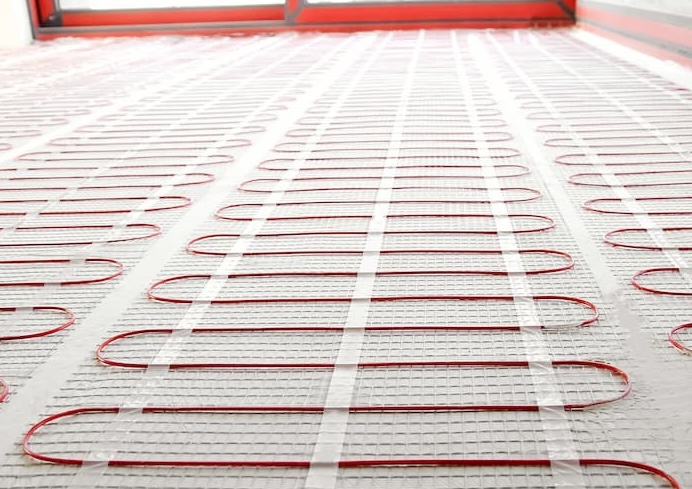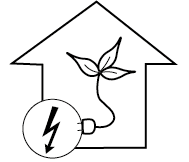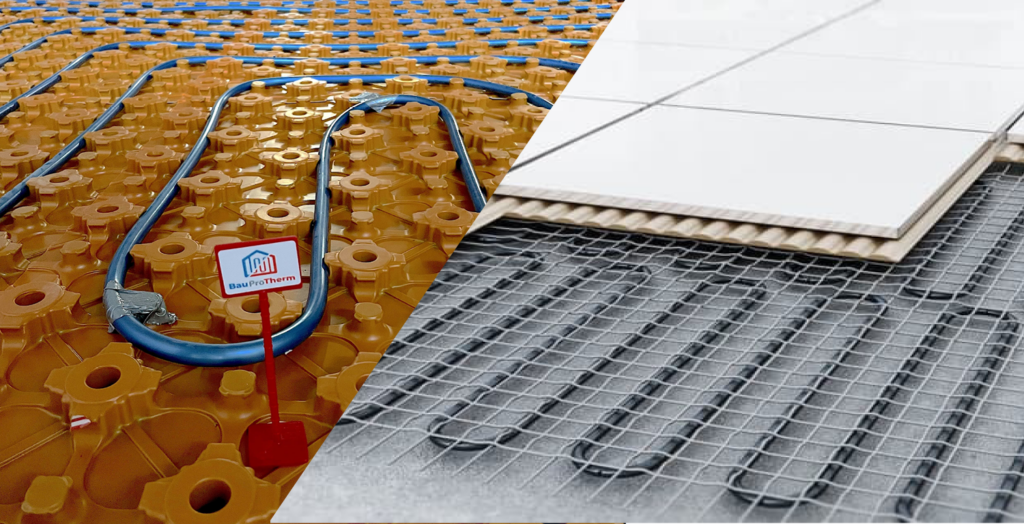Electric vs. hot water: The optimal underfloor heating for your home
Choosing the right underfloor heating for your home can be a significant decision that affects both your comfort and energy efficiency. In this blog article, we will explore the pros and cons of electric underfloor heating and those that run on hot water. Let's explore together which system suits your needs better.
Basics of underfloor heating
Before we get into the specific pros and cons of the two main types, let's take a look at the basics of underfloor heating. How do these systems work, and what advantages do they offer compared to traditional heating methods?

Focus on electric underfloor heating
I. Installation and operation:
Electric underfloor heating systems are characterized by their less complicated installation. The heating mats or cables are laid directly under the flooring and only require an electrical connection. Therefore, they are well suited for retrofitting or renovation, as the intervention in the building fabric is minimal. However, it is important to note that the installation should be done by a professional to ensure that all safety standards are met.
The operation of electric underfloor heating systems is usually carried out by room thermostats, which allow precise control of the temperature. These systems react relatively quickly to changes and offer the possibility of individually regulating the temperature in individual rooms. However, it should be noted that the electricity consumption for operation will be higher than for hot water systems, which will affect the long-term costs.
II. Cost aspects:
When it comes to the cost of installing electric underfloor heating, both the purchase of the heating mats or cables and the installation costs should be taken into account. Although installation costs may be lower compared to hot water systems, electricity consumption is a determining factor in long-term operating costs. It is advisable to carry out a cost-benefit analysis and take into account local electricity prices before making a decision.
Electric underfloor heating systems usually require no maintenance because there are no moving parts or complex piping systems.
III. Energy efficiency:
The energy efficiency of electric underfloor heating depends on various factors, including the insulation of the room and the type of flooring. Since these systems are located directly under the floor, the heat is evenly distributed throughout the room. This can contribute to more efficient space heating, as the heat is generated where it is needed.

Modern electric underfloor heating systems have smart thermostats and sensors that can optimize energy consumption. It is advisable to opt for a system with programmable thermostats to adjust the heating as needed and thus save energy.
Underfloor heating with hot water in detail

I. Installation and operation:
Hot water underfloor heating requires careful planning and installation, as it requires a network of pipes that runs through the floor. This pipe system is connected to a hot water source, which is typically fed by a gas or oil heating system, heat pump or other heat generator. Installation is more complex than with electric underfloor heating and usually requires professional support.
The operation of hot water underfloor heating is carried out by circulating hot water through the pipe system. This allows for even heat distribution in the room. The temperature is controlled by a central thermostat in the room, which controls the hot water source.
III. Energy efficiency:
The energy efficiency of hot water underfloor heating depends on the efficiency of the heat generation unit and the quality of the building's insulation. The advantage of this system is that it can operate at lower flow temperatures than conventional radiators, resulting in energy savings.
Modern hot water systems can also be operated in conjunction with renewable energy sources such as solar thermal or heat pumps, which improves the environmental friendliness of the system.
Environmental aspects: electric vs. hot water

I. CO2 balance
The environmental impact of heating systems is a growing concern. How do electric and hot water underfloor heating systems compare in terms of their CO2 balance?
When assessing the CO2 balance, it should be noted that the environmental impact of electric underfloor heating systems depends heavily on the type of electricity generated. If the electricity comes from renewable sources, electric underfloor heating can be an environmentally friendly option. Hot water underfloor heating has a low CO2 balance.
II. Sustainability
To what extent are the materials used for the two types of underfloor heating sustainable? What role does the lifespan of the systems play in terms of environmental impact?
The sustainability of underfloor heating systems depends on various factors, including the production of the materials, their lifespan and how they are disposed of. Electric underfloor heating systems usually have fewer moving parts and can therefore last longer. The heating mats or cables are often made of recyclable materials, which improves their environmental friendliness.
Hot water underfloor heating requires a pipe system that is embedded in the floor. The pipes are often made of materials such as plastic. Here it is important to pay attention to environmentally friendly materials that are recyclable. In addition, modern hot water systems are designed to work efficiently with renewable energy sources, which improves their environmental performance.
Another aspect of sustainability is the lifespan of the system. High-quality underfloor heating systems, regardless of the type, can last for many decades. The longevity of a system helps to reduce the need for spare parts and new equipment, which in turn saves resources.
Disposal is another point that should be taken into account when it comes to sustainability. Electric underfloor heating has the advantage that it contains less complex components and can therefore be easier to dispose of. In the case of hot water systems, care should be taken to ensure that the pipe system is disposed of in an environmentally friendly manner.
Which underfloor heating system is best for you?
I. Individual needs
An overview of how your personal needs and requirements can influence the choice between electric and hot water underfloor heating:
The decision between electric and hot water underfloor heating depends heavily on individual needs. Factors such as the size of the room, the building structure, energy consumption and personal preferences should be taken into account in the decision-making process. A thorough analysis of your requirements will help you find the system that best suits your home.
II. Expert advice
Why it is advisable to seek advice from professionals before making a decision. Expert opinions and their importance in choosing the right system:
A professional can assess your specific situation, make recommendations, and help you understand the long-term costs as well as environmental impacts. In doing so, he takes into account not only the structural conditions, but also your personal preferences in terms of comfort and environmental compatibility.
Experts can also make suggestions for sustainable practices, such as integrating renewable energy or using smart control systems to optimize energy consumption.
Get your quote from us and benefit from the experience and expertise of our experts.
III. Long-term cost-benefit analysis:
A thorough analysis of long-term costs is crucial. This includes not only the initial cost and operation, but also possible maintenance costs and the service life of the system. Electric underfloor heating systems can be cheaper to buy, but have higher operating costs. Hot water underfloor heating may require a higher investment, but it can lead to savings in the long run.
Don't forget to check out potential government support programs or tax benefits that can affect the financial outlay.

Result
Choosing between electric underfloor heating and hot water underfloor heating is not an easy decision, but requires a thorough analysis of your individual needs, financial possibilities and environmental goals. Both systems offer unique advantages and disadvantages that need to be aligned with your priorities.
The installation and operation of electric underfloor heating systems are characterized by their simplicity and flexibility. They are well suited for renovations and retrofits, as they require less structural intervention. The faster response time and the possibility of individual room temperature control are further advantages. Nevertheless, the higher operating costs due to electricity consumption and the CO2 balance of the electricity used should be carefully weighed.
On the other hand, hot water underfloor heating systems require more elaborate installation, but offer a more efficient heat supply in the long term. Due to low flow temperatures and the integration of renewable energies, they can be a more sustainable option. However, the higher initial cost and the need for professional installation should be taken into account when making the decision.
The environmental aspects should not be ignored. The CO2 balance and the sustainability of the materials are decisive factors that influence the ecological footprint of your underfloor heating. Advice from a professional can help you incorporate sustainable practices, whether through renewable energy or high-quality, recyclable materials.
Individual needs play a key role. Quick installation, flexible room temperature control, and ease of maintenance could be crucial for some homes, while others prioritize long-term energy savings and environmental sustainability.
Ultimately, cooperation with a professional is indispensable. Our experienced experts can assess your specific situation, make recommendations and ensure that the chosen underfloor heating system is the best fit for your home. The long-term cost-benefit analysis, taking into account the investment costs, operating costs and possible subsidies, is crucial for an informed decision.
In the overall view, it's all about finding the balance – underfloor heating that not only meets your comfort requirements, but is also economically and ecologically sustainable. Thoughtful consideration and expert advice will help you make the right choice for your underfloor heating and provide your home with efficient, cosy warmth.
